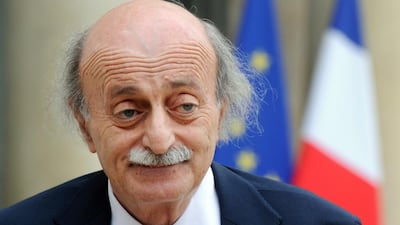An interview I conducted with the Lebanese politician Walid Jumblatt last week somehow received a great deal of attention in Lebanon. Mr Jumblatt was speaking to Diwan, the new blog of the Carnegie Middle East programme, which I edit.
The Druze leader covered a wide range of Lebanese and regional topics, and his remarks were, collectively, an assessment of the region’s disarray. Mr Jumblatt matters because he has spent almost 40 years navigating the treacherous waters of Lebanese politics, and is still alive to apply the lessons learnt. He remains a dominant figure, despite his tiny community, and the way he leans in search of communal survival is a good indication of where Lebanon is heading.
Many of Mr Jumblatt’s individual statements were highlighted in the media, not least that he would not reconcile with Syrian president Bashar Al Assad because he would prefer to commit political suicide on his own terms. However, the Druze leader painted a more general context for his interpretation of regional developments. And it is this that his political enemies in particular must have retained.
In effect, Mr Jumblatt admitted five things. He mocked the international community over Syria and underlined that the United States was both “weak” and “didn’t care” about the Middle East. This situation led him to conclude, secondly, that the future of the region would be defined by “power-sharing” between the Americans, the Russians and the Iranians. Bolstering Iran’s influence was the nuclear deal the international community signed with Tehran.
Mr Jumblatt’s third admission was that Mr Al Assad would remain in office, “unfortunately and cynically and immorally”. At the same time, Lebanon would not have a president, because the election process was blocked by Iran and Syria. Both were looking to win in Syria and then “impose on Lebanon a new diktat, maybe with new terms”. This would be facilitated, he implied, by the fact that his strongest ally, Saad Hariri, was getting “weaker and weaker”.
And finally, when asked about his relationship with Hizbollah, given that it supported a Syrian regime he so ardently opposes, Mr Jumblatt replied: “To survive means to have good relations with all the components in the country, above all [Hizbollah]. That’s it. That’s the safest way for the Druze to survive and retain what they still have politically and demographically.”
Mr Jumblatt is a shrewd man and he was keen to publicise the interview, placing it on the website of his party newspaper. While up front the interview was a repetition of many of the things he said before about Syria and the region, particularly his antagonism toward Mr Al Assad and his criticisms of Russia, the essence of his portrayal was that Iran and Syria had won in Lebanon. And if Mr Jumblatt’s main aim is to ensure his community’s survival, adjusting to this new reality is imperative. This was the implicit message he was sending.
That is why I had asked the Druze leader about reconciliation with the Syrian president. He angrily rejected the idea. The more important question, which should have been posed, was whether his son Taymour, who today is slowly assuming the mantle of Druze leadership, would do so? After all, Mr Jumblatt himself travelled to Damascus after the assassination of his father in 1977, though he knew the Syrians were behind the killing, in order not to find himself on the wrong side of their new hegemony over Lebanon.
Mr Jumblatt’s two priorities have always been to preserve his community and Jumblatti leadership over the community. As the balance of power in the region shifts to the advantage of Iran and the Assad regime, the Druze leader will have little choice but to find a role for himself within this new alignment. He may not like it, but Mr Jumblatt is not someone who allows displeasure to undermine business. He might personally attack Mr Al Assad, but if his survival means a Jumblatt has to deal with him, so be it.
For Lebanon as a whole, the war in Syria will have existential repercussions. Not only is there a substantial Sunni Syrian refugee population in the country that has radically altered the demographics of the country; but Mr Al Assad and Hizbollah are keen to reverse the gains of 2005, when the Syrian army withdrew from Lebanon after the assassination of the former prime minister Rafik Hariri.
Amid western indifference and Arab weakness, it is difficult to imagine Hizbollah’s foes putting up effective resistance to such dynamics. Mr Jumblatt’s message depressed many people, but the more important question they should have asked was how he intends to come to grips with the situation. By showing his enemies that he recognised that his calculations had failed, the Druze leader seemed to be admitting that he, or rather his family, would adapt.
Whether that buys Mr Jumblatt breathing space is unclear. But his priority is that it buys his son and political heir the margin of manoeuvre needed for him to continue in survival mode.
Michael Young is a writer and editor in Beirut
On Twitter @BeirutCalling


